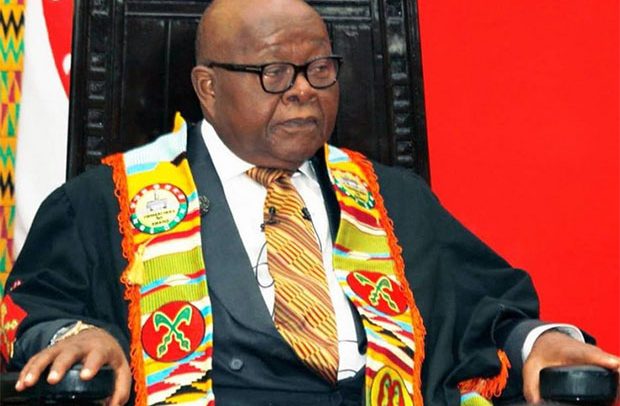Professor Mike Oquaye
THE Speaker of Parliament, Professor Mike Oquaye, has hinted the passage of a law to help protect people accused of witchcraft, saying Parliament is going to seriously apply itself to employ Private Member’s Bill as an instrument of social engineering in the next meeting.
According to him, the highlights of the proposed Witchcraft Bill include the prohibition or professional witchcraft or wizardry, prohibition against the accusation of witchcraft, participation in the declaration of a person as a witch or wizard and penalty against chief or headman encouraging witchcraft.
Prof. Oquaye indicated that the law was being pushed by a research institute in Ghana as part of the Private Member’s Bill project.
The proposed law comes on the heels of the recent callous lynching of 90-year-old Akua Denteh for being a ‘witch’ at Kafaba, near Salaga in the Savannah Region.
Witchcraft-related beliefs and practices have resulted in serious violations of human rights, including beatings, banishment, cutting of body parts, and amputation of limbs, torture and murder around the world.
Women, children, the elderly and persons with disabilities, especially persons with albinism, have been vulnerable, and in spite of the seriousness of these human rights abuses, there is often no robust response.
In his closing remarks to end the second meeting of the fourth session of the seventh Parliament, Speaker Oquaye said he had tasked a consultant on Private Member’s Bill, Mrs. Ofori-Boateng, and Lawyer Sena to undertake a research for a law to produce a draft bill which will deal with the injustice.
“Recently, we all woke up to a shocking revelation that a 90-year-old woman had been beaten to death in public because she was declared a witch by a spiritualist/witch doctor.
“I also received a petition from a Research Institute in Ghana for a law to be passed in Ghana on this and I charged the consultant on Private Member’s Bill, Mrs. Ofori-Boateng, and Lawyer Sena to undertake a research,” he disclosed.
Prof. Oquaye added that the proposed bill, which will come from the research work, would be referred to the Parliament’s Constitutional and Legal Committee for further action.
“Notably, African nations, such as Zambia, Tanzania, South Africa and Zimbabwe, have provided for the laws being proposed,” he added.
By Ernest Kofi Adu, Parliament House


